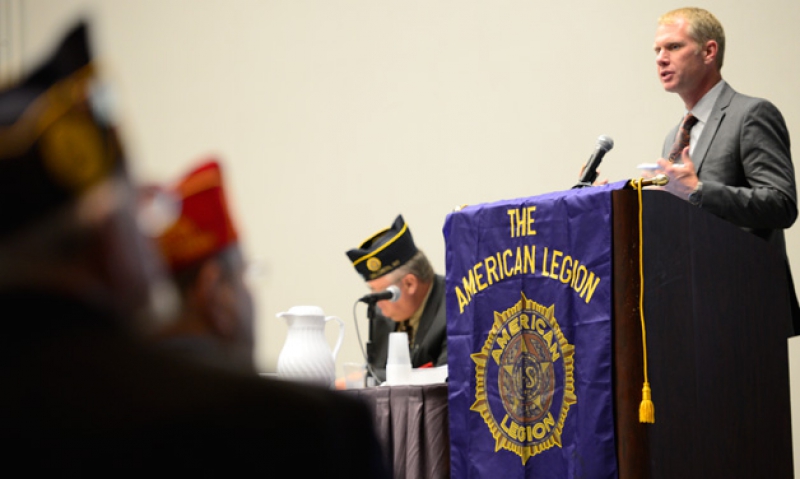
The Legion's Veterans Affairs & Rehabilitation Commission was briefed on veterans' suicide, veterans treatment courts and the Veterans Justice Outreach Program.
Five years and 890,000 calls to the Veterans Crisis Line later, the Department of Veterans Affairs (VA) estimates that it has helped about 30,000 veterans from committing suicide, according to Robert Bossarte, a VA epidemiologist who did a two-year study on veterans' suicide in America.
Addressing The American Legion’s Veterans Affairs & Rehabilitation Commission on Aug. 25 in Houston during its National Convention, Bossarte said VA now uses 300 suicide prevention coordinators nationwide in its fight to keep America's veterans from ending their lives. It has been reinforcing its mental health resources and services, created the VeteransCrisisLine.net website, and continues to provide counseling, outreach and referral services through Vet Centers nationwide.
The Department of Defense and VA, Bossarte said, are improving on their collaboration to prevent suicides among veterans. In the future, the two departments aim to expand their suicide prevention efforts to the point-of-entry, when men and women first join the military.
Robert Russell, founder of and judge for the Veterans Treatment Court in Buffalo, N.Y., shared his experience with the special court system that deals with cases involving veterans who suffer from substance abuse and mental-health issues.
In 2006, while working with a Vietnam War veteran being tried for a crime in a mental-health court, Russell wondered, "Is there something more we should be doing for veterans in our court system?" He spoke with representatives from VA, The American Legion and other veterans service organizations (VSOs), talking with them about what a "veterans court" would look like.
The elements for such a court began to develop: a staff member from the local VA medical center, a representative from the Veterans Benefits Administration (VBA), and another representative from a VSO. That way, Russell said, a Legion service officer could fill out paperwork for benefits earned by the accused veteran, and delivered to the VBA rep right there in the courtroom.
The Veterans Treatment Court has been succeeding, Russell said, as they have been all across the country. More and more veterans accused of a crime, who have mental-health issues, are avoiding prison sentences and getting help through VA treatment programs.
Russell said that 51 percent of all veterans in the treatment court system have deployed to Iraq and/or Afghanistan; 19 percent are from the Persian Gulf War era; 73 percent are unemployed; and 42 percent suffer from post-traumatic stress disorder.
Treatment courts, Russell said, are an important tool in overcoming what he called "warrior mentality," the reluctance of many veterans to seek assistance for their disabilities. "Asking for help is not a sign of weakness," he said.
Jim McGuire of the Veterans Health Administration briefed the commission on the agency's Veterans Justice Outreach Program (VJOP), which he directs. The program enables veteran mentors to help other veterans who are already being tried by the U.S. justice system. To date, 168 courts are taking part in the program, with another 100 planning to participate.
McGuire said that VJOP is working with about 1,000 prisons; about 80 percent of America's total incarceration centers. The program also provides "re-entry" assistance for veterans leaving the prison system and returning to civilian society. From August 2007 to last June, more than 53,000 veterans released from prison have been placed into VA mental health services through VJOP.
VA employs 172 full-time veterans justice outreach specialists, with another 74 positions scheduled to be filled in 2014. More than 58,000 veterans have benefited from the work of these specialists, from October 2009 to this past June.
- Veterans Healthcare

